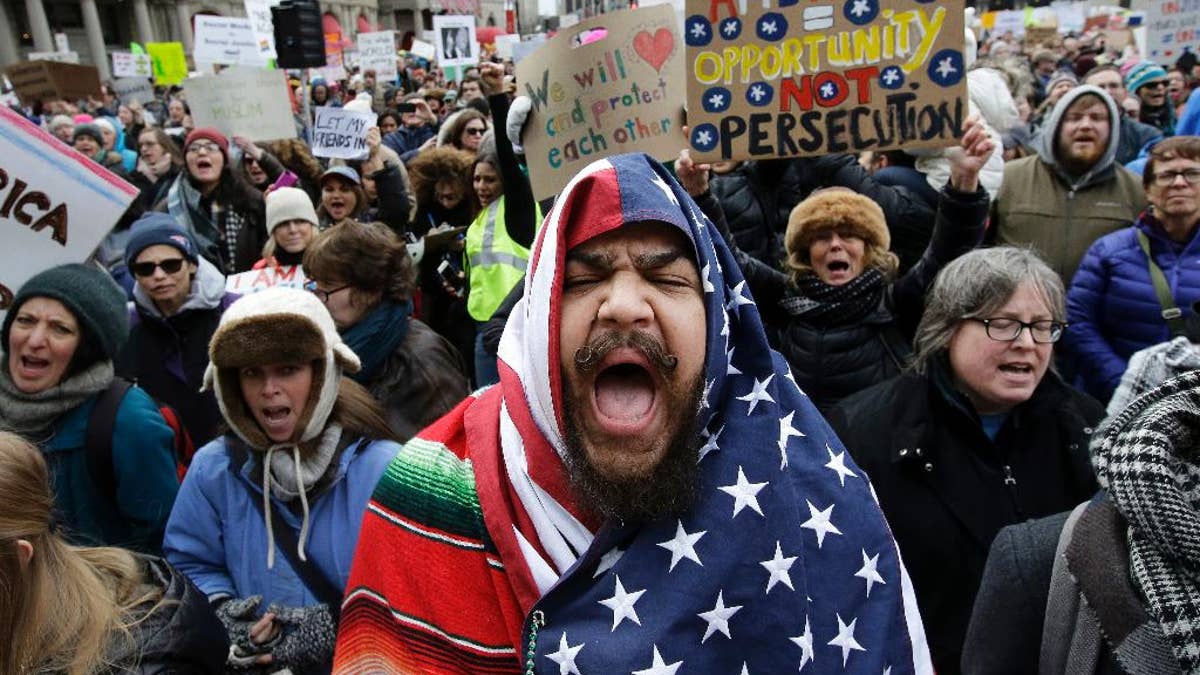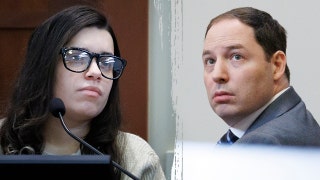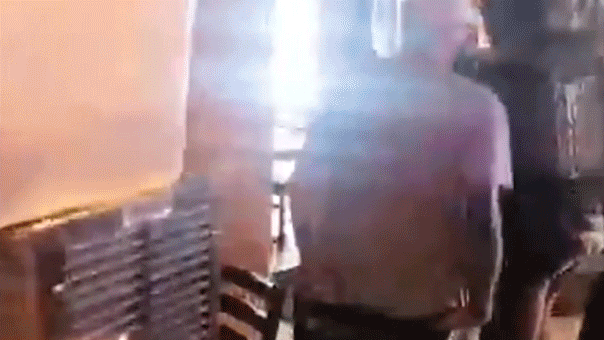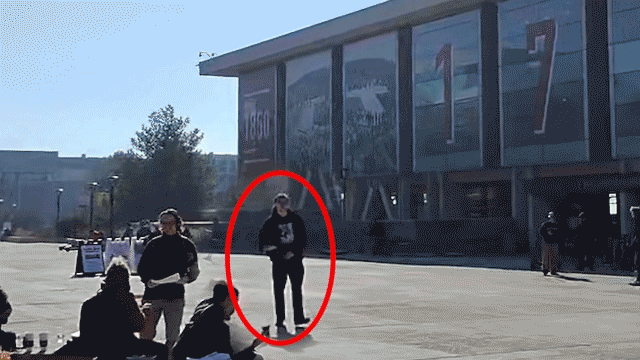
Izzy Berdan, of Boston, center, wears an American flags as he chants slogans with other demonstrators during a rally against President Donald Trump's order that restricts travel to the U.S., Sunday, Jan. 29, 2017, in Boston. Trump signed an executive order Friday, Jan. 27, 2017 that bans legal U.S. residents and visa-holders from seven Muslim-majority nations from entering the U.S. for 90 days and puts an indefinite hold on a program resettling Syrian refugees. (AP Photo/Steven Senne) (The Associated Press)
WASHINGTON – Donald Trump campaigned as a disrupter. Now he's governing by chaos.
Trump's temporary halt to the U.S. refugee program — the most consequential policy he's unveiled in his presidency's opening days — wreaked havoc at airports and sparked protests across the country. The order left Trump's own government agencies scrambling, his Republican Party divided and allies around the world uneasy. A federal judge issued an emergency order temporarily blocking part of the measure, setting up a legal battle ahead.
Trump could have avoided at least some of these consequences. He could have consulted significantly with the agencies tasked with implementing the order. He could have delivered a speech explaining his action and its intent in detail to the American people. His team could have prepared a contingency plan for the newly banned travelers already en route to U.S. as Trump signed the order.
Instead, Trump showed that not only does he intend to follow through on his controversial campaign promises, he plans to do so in the spirit of the mandate his advisers believe he has: disrupting Washington and setting fire to the playbook its leaders have long relied on.
It's not clear whether the White House acted Friday knowing the consequences that would follow. But on Saturday, as protesters crowded U.S. airports where legal U.S. residents were stuck in limbo, the president declared he was pleased with the results.
"It's working out very nicely," Trump said Saturday.
Trump is known to tolerate considerable instability and fluidity in his inner circle. His campaign was often improvisational and unpredictable, driven at times by the split decisions of the candidate. As a chief executive of a private company, Trump rarely had to contend with the complexity or scrutiny involved in operating the federal government.
Even before the chaos surrounding the refugee restrictions, Trump was sowing confusion in his first days in office.
He announced an investigation into voter fraud — on Twitter — but a scheduled signing of the executive action was canceled at the last minute. He clashed with the president of Mexico, one of America's most important international partners, over his planned southern border wall, prompting President Enrique Pena Nieto to cancel a visit to Washington. A spokesman raised the prospect of paying for the wall with a 20 percent tax on all imports from Mexico, only to quickly backtrack.
As the weekend wrapped up, Trump's White House appeared to be acknowledging the trouble with governing by decree. Top aides scrambled to explain the policy and offer guidance to those implementing it.
A statement from the president sought to clarify that Trump was not intending a ban on all Muslims. Aides also backed off earlier assertions that a full ban on entry from seven Muslim-majority countries applied to those with U.S. legal permanent residency "green cards." The White House, which was largely silent about details of the refugee restrictions after Trump signed the order, hastily arranged two briefings for reporters over the weekend.
Still, Trump heads into his second full week in office facing a test on which presidencies can rise and fall: selling a controversial and complicated policy to the public. He'll do so against the backdrop of a steady stream of sympathetic stories about families split up by the refugee ban, and children and the elderly detained at U.S. airports.
Meanwhile, experts dispute Trump's assertion that the policy is needed to keep Americans safe. Recent acts of deadly extremist violence have been carried out either by U.S. citizens or by individuals whose families weren't from the nations singled out.
Many of Trump's loyal supporters no doubt back his actions and his decisive, urgent approach. As a candidate, Trump called for a full ban on Muslims coming to the U.S., then shifted his focus to temporarily halting entry from countries with terror ties to give the government time to implement "extreme vetting" measures.
Some Republicans also leapt to Trump's defense, including House Speaker Paul Ryan, who said it was "time to re-evaluate and strengthen the visa-vetting process."
But Trump is otherwise left with few defenders, even within his own party. The White House spent little time briefing lawmakers on the order before the president signed it, leaving even those who might be inclined to support the directive with little information to help make Trump's case.
Other Republicans were willing to publicly break with their party's new president.
"This executive order sends a signal, intended or not, that America does not want Muslims coming into our country," Republican Sens. John McCain and Lindsey Graham said in a joint statement. "That is why we fear this executive order may do more to help terrorist recruitment than improve our security."
The business executives and Silicon Valley moguls whose support Trump has been trying to cultivate also appeared caught off guard. Some issued statements criticizing the directive, noting the positive impact immigration has had on their businesses.
And allies — including British Prime Minister Theresa May, who spoke warmly about building a relationship with Trump after a visit to the White House Friday — panned the measure. For world leaders who depend on America's stability, Trump's action seems likely to only deepen their leeriness of his vows to govern unpredictably.
"This will be one particularly egregious piece of evidence of their judgment of the whole man — and it's a pretty negative judgment," Eliot Cohen, a State Department counselor under former President George W. Bush, said of the world's response.
___
Editor's Note — Julie Pace has covered the White House and politics for AP since 2007. Follow her at http://twitter.com/jpaceDC









































